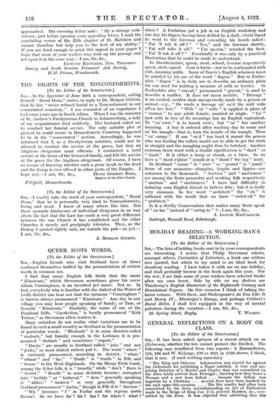QUEER SCOTS WORDS.
[To the Editor of the SPECTATOR.]
Sm,—English friends who visit Scotland have at times confessed themselves baffled by the pronunciation of certain words in common use.
I find that many English folk think that the name " Kinnicum," which Stevenson sometimes gives his nurse Alison Cunningham, is an invented pet name. Not so. In fact, everybody who is familiar with the dialect of the Water of Leith district can bear out that the surname " Cunningham " is therein always pronounced " Kinnicum." Any day in any village you may hear people speaking of Sandy, or Tam, or Geordie " Kinnicum." Similarly, the name of one of the Pentland Hills, " Caerketton," is locally pronounced "Kirk Yetton," as Stevenson often renders it.
Many outsiders do not realize what variations are to be found in such a small country as Scotland in the pronunciation of particular words. "Rhubarb" is in some districts called " rooburb," but funnily enough in the Lothians it is pro- nounced " rhubart " and sometimes " rupart."
" Ducks " are usually in Scotland called " juks " and not " jeuks," as most dialect writers put H. The word " where " is variously pronounced, according to district, " whar," " whaur " and " far." " Truth " is " traith " in Fife and " troose " in the West Highlands. On the Moray Firth Coast, among the fisher folk, it is " trowth," while " don't " there is downt." " Beadle " in some districts becomes corrupted into " baithle " or " betheral." " Acre " generally speaking is " akker." " Andrew " is very generally throughout Scotland pronounced " Andra," though in Fife it is " Aneraw." `! Wh " becomes " f " in Forfar and the regions north thereof. So we have far ? fat ? fan' ? for where ? what ? when ? A Forfarian got a job in an English workshop and one day his fingers having been deified by a dark, viscid liquid he went to the foreman and extending his hands asked : " Fat '11 tak it aff ? " " Yes," said the foreman shortly, " Fat will take it off." " I'm speirin," retorted the Scot. " Fat '11 tak it aff ? " Eventually it was only by a practical illustration that he could be made to understand.
In Aberdeenshire, spoon, stool, school, become respectively speen, steel, squeel. Coat is kwite—not to be confounded with cult, meaning ankle. Some of Barrie's English admirers must be puzzled by his use of the word " flagon." But in Forfar- shire " flagon " is in daily use to describe an ordinary plain tin can used for holding a measure of milk or berries. In Forfarshire also " cravat," pronounced " gravat," is used to describe a muffler. It does not mean necktie. " Breenge " is an excited, sudden dash unexpectedly made by a person or animal—e.g., " He made a breenge an' ca'd the auld wifie aff'cn her feet." " Wife " or " wifie ?' is applied in place of " woman " to any adult female, married or single. " Ca' " (not call) in two of its meanings has no English equivalent.
To "ca' owre " is to knock over ; but " " has another meaning. A boy is ordered after washing day to come and ca' the mangle—that is, turn the handle of the mangle. Thus " ea' canny." If one " ca'd " too hard it meant the person who was feeding the rollers would not be able to get the cloth in straight and the mangling might thus be botched. Another common Scots word with a double signification is " daad " or " daud." It is either a lump or chunk, or a blow. So we have a " daud o'glaur " (mud) or a " daud i' the lug " (ear).
In Scotland " ounce " is " unce " as " pound " is " pund." Some of our measures—chappins, forpits and lippies—are unknown to the Sassenach. " Auction " and " auctioneer " are among the Scots peasantry and working folk respectively " unction " and " unctioneer." I have had difficulty in inducing F °me English friends to believe this ; but it is really very common. In the word " architect " the " ch " is softened with the result that we have " erchitcck " for " architect."
Is it a thrifty Conservatism that makes many Scots speak of " on tae " instead of " owing to " ?—I am, Sir, &c.,


































 Previous page
Previous page